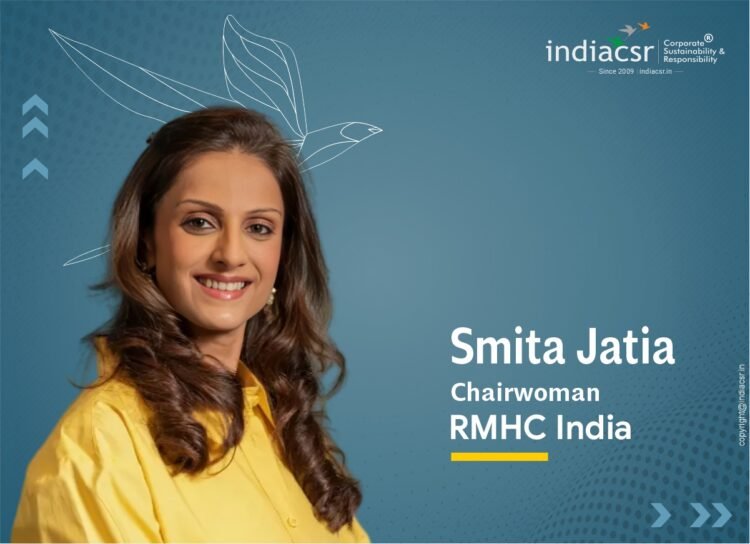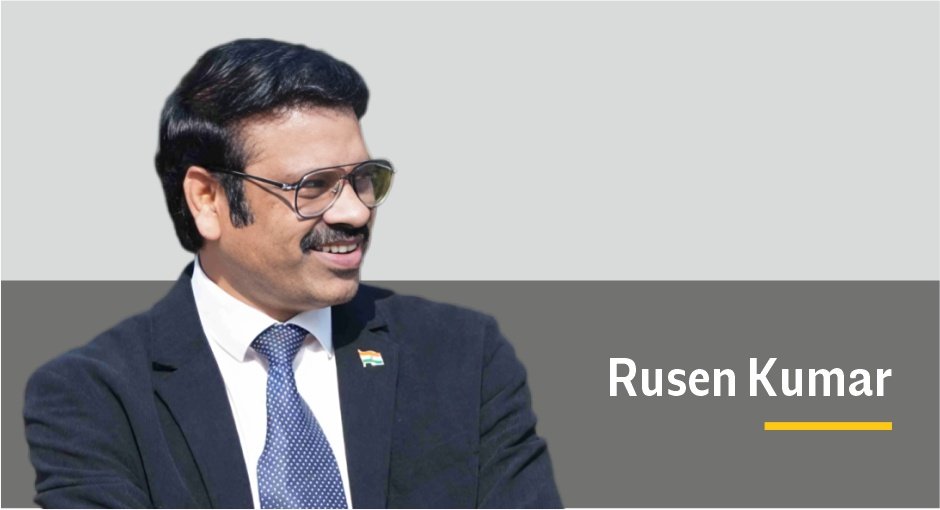
By Rusen Kumar
MUMBAI (India CSR): In an exclusive conversation with Rusen Kumar, Editor of India CSR; Smita Jatia, Chairwoman of Ronald McDonald House India, shares the powerful vision behind establishing India’s first Ronald McDonald House in Mumbai. Rooted in compassion and driven by impact, this initiative redefines how corporate social responsibility (CSR) can extend beyond funding to create a sustained ecosystem of care for families with critically ill children.
From global best practices to local adaptations, Jatia explains how the House bridges the gap between hospital care and home comfort — embodying the spirit of “care beyond medicine.” She also reveals RMH India’s ambitious roadmap to expand nationwide by 2030, providing thousands of families hope, comfort, and dignity during their most difficult journeys.
Excerpts:
Q. What inspired Ronald McDonald House to establish its first House in India, and why was Mumbai chosen as the location?
A. At Ronald McDonald House, our vision is simple yet powerful — to keep families close when they need it the most. Establishing India’s first Ronald McDonald House is a natural extension of our long-standing commitment and deep personal understanding of what families go through when their child needs specialized medical care. For over 51 years globally, Ronald McDonald House has been serving this mission, providing comfort, care, and togetherness to families with hospitalized children across more than 60 countries.
When we started Ronald McDonald House with Family Rooms in 2016, we witnessed firsthand the immense challenges families face when travelling long distances to access specialized paediatric care for their child’s treatment. When a child is seriously ill, the entire family is affected emotionally, financially, and physically. These families often struggle to manage safe accommodation, clean and hygienic meals, navigate transportation to and from hospitals — all while carrying the emotional and financial burden of their child’s illness.
The Ronald McDonald House bridges this gap by providing a safe, comfortable, and caring environment. We believe we are addressing the ‘care and support beyond medicine’ gap in the country. We believe that care is incomplete if it focuses only on the patient. The entire family needs support. Through this initiative, we aim to not only reduce the stress and financial burden on families but also to improve overall child health outcomes. Our House addresses this by creating a comprehensive support system where families can stay together during treatment periods in a safe space and connect with others walking similar paths.
Mumbai was a natural choice for our first House given the concentration of leading paediatric hospitals in the city, including BJ Wadia and Tata Memorial Hospital. The significant volume of families traveling from rural areas and smaller towns across Maharashtra and neighbouring states to access specialized treatment in Mumbai created an urgent need for our services in this location.
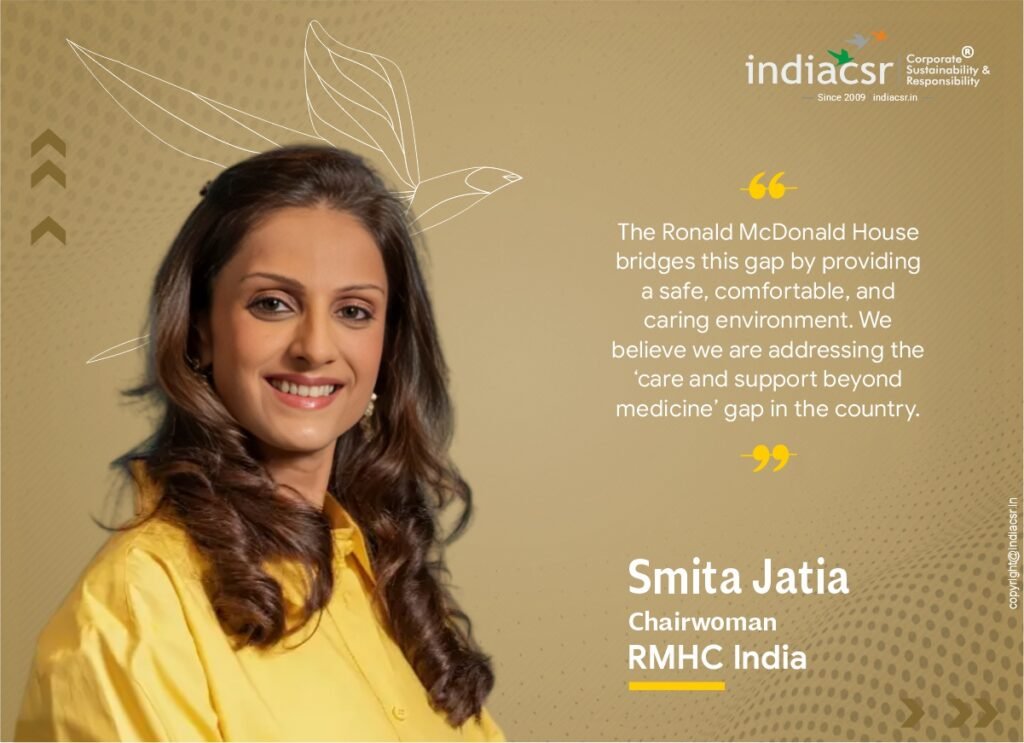
***
Q. CSR is often equated with cheque-writing. How does RMH India represent a shift towards deeply embedded, impact-driven CSR?
A. Ronald McDonald House is an independent not-for-profit organization. We represent a fundamentally different model where sustained engagement and measurable outcomes are at the core of our approach. Our model moves beyond transactional philanthropy to create lasting institutional infrastructure that addresses systemic challenges. While financial support is essential, what makes our approach different is how we combine funding with operational excellence, community engagement, and strategic partnerships to create sustainable impact.
For our corporate partners, involvement with Ronald McDonald House offers multiple engagement touchpoints, from employee volunteering to skill-based contributions. This creates meaningful connections between corporations and the families they’re supporting, fostering genuine empathy.
We believe that the future of CSR in India would be where companies become true stakeholders in bringing change than becoming just donors. When corporations integrate deeply with causes, the solutions created tend to be more innovative, sustainable, and ultimately more effective.
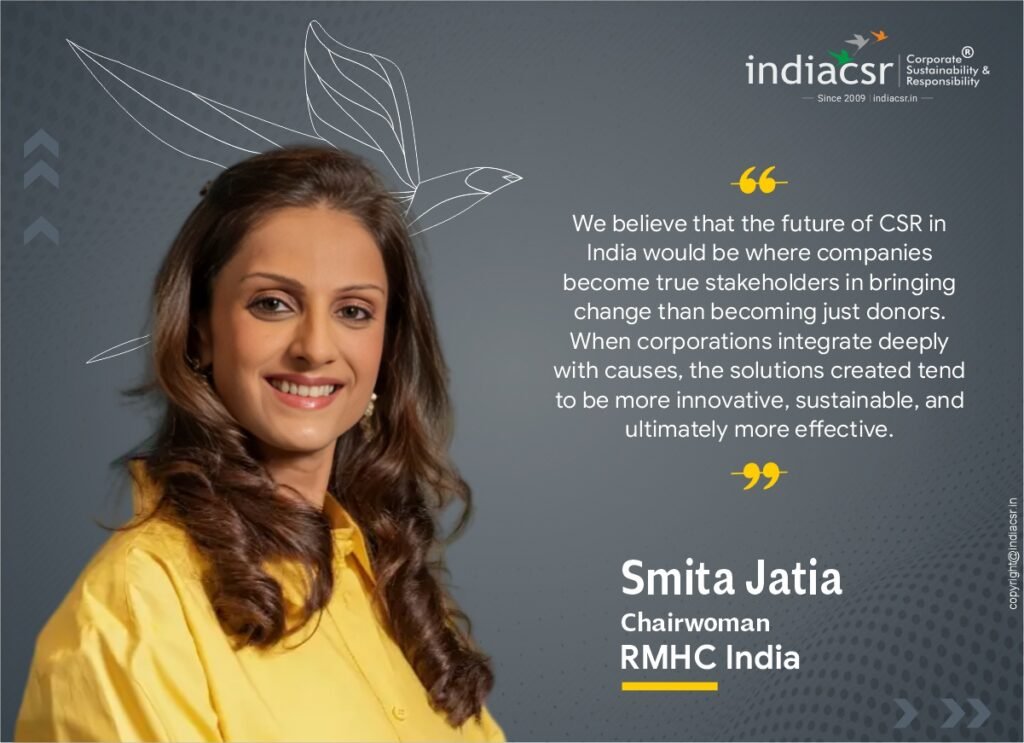
***
Q. What lessons from global RMH operations are transferable to India, and what adaptations are uniquely required in the Indian context?
A. With over 51 years of experience and more than 380 Houses worldwide, RMHC has developed a globally tested model of family-centered care — one that focuses on emotional well-being, proximity to medical care, and community support as essential parts of a child’s recovery. These core principles are universal and have seamlessly guided our approach in India as well. From operational perspectives, the global best practices around creating home-like environments, maintaining hygiene protocols, and building relationships with medical institutions have provided us with invaluable blueprints.
However, India’s context brings its own unique realities — like large distances families travel for treatment, financial constraints, and the emotional toll on caregivers who often navigate the healthcare system for the first time. To meet these needs, we have adapted the global model with locally relevant elements such as nutritious Indian meals, communal spaces, multilingual communication, transport facility to and from the hospital, and partnerships with local NGOs and hospitals to ensure inclusive access and care.
We have maintained the spirit and quality standards of Ronald McDonald Houses worldwide while creating something authentically Indian in its approach and expression. The result is a model that is globally inspired, yet deeply rooted in local compassion.
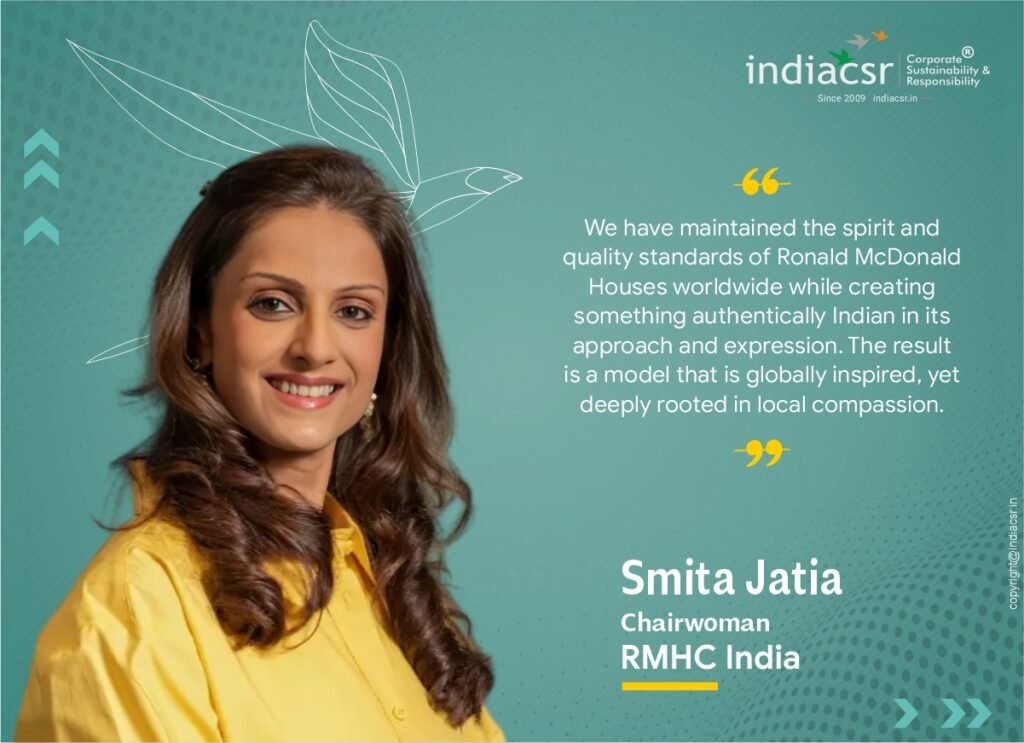
***
Q. Can you share some of the key facilities and services available at the Mumbai House that differentiate it from other support options?
A. Every element of the House has been thoughtfully created to ease these burdens. It has 16 comfortable private rooms that offer families dignity and personal space, crucial for emotional well-being during extended medical treatments. Fully equipped kitchen with nutritious groceries that allow families to have clean, hygienic and nutritious food as per their requirements. Warm communal spaces that allow parents to find strength in shared experiences and a shuttle service connecting them to the hospital, as we have observed how navigation difficulties and travel costs create additional burdens for already-stressed families.
Operationally, we maintain a careful balance between professional management and compassionate care. We follow Ronald McDonald House global standards of hygiene, safety, and care. The House is professionally managed by trained staff, with strict protocols for cleanliness, nutrition, and infection control, round-the-clock to ensure families have support whenever needed. Just as importantly, emotional well-being is at the heart of what we do through counselling support, volunteer engagement, and a nurturing environment that allows families to rest, recover, and focus entirely on their child’s healing.
This model ensures continuity of care beyond medical treatment. It is about caring for the family so that they can care for their child.
***
Q. How does the Ronald McDonald House model contribute to a child’s recovery and overall family well-being? How will the Mumbai House support families travelling from other states for their child’s medical treatment?
A. In India, the concept of family is at the core of our identity and healing traditions. It has sustained us for generations and is built on the understanding that we heal better together. When a child is ill, particularly with conditions requiring specialized care, families often must travel great distances to major medical centers, disconnecting them from this crucial support system, homes, and livelihoods. The importance of providing a home-like environment closer to the hospitals becomes important when we consider both emotional and practical realities. Emotionally, children recover better when surrounded by family.
The financial burden of accommodation in cities like Mumbai can be overwhelming for families from rural or semi-urban areas. Many families face impossible choices — either drain their savings on accommodation or sleep on hospital floors and pavements. We have also seen parents sacrificing meals to afford surviving.
A ‘home-like’ environment offers exactly that. It gives parents and the kids a safe place to stay, nutritious meals, and the ability to focus on the recovery of their child without worrying about logistics or costs. This not only reduces their anxiety but has been shown globally to improve recovery outcomes for children. Through the Ronald McDonald House, we aim to provide families with a sense of normalcy and dignity in the middle of uncertainty.
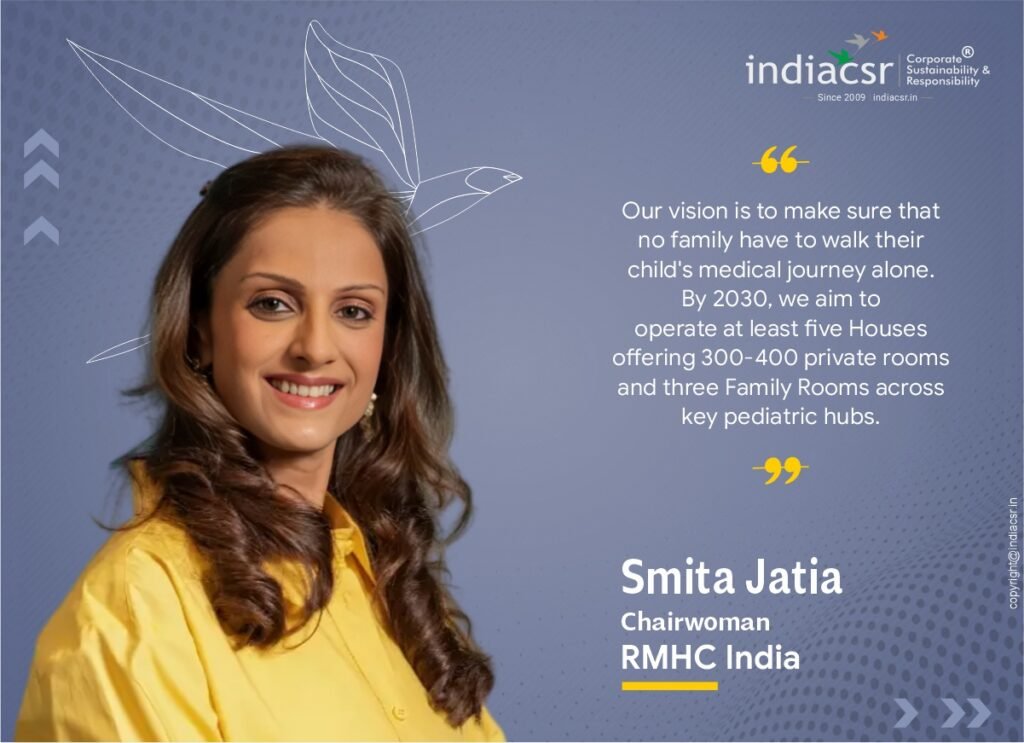
***
Q. What is the long-term vision for Ronald McDonald House India, and how many Houses or Family Rooms are planned by 2030?
A. Our vision is to make sure that no family have to walk their child’s medical journey alone. By 2030, we aim to operate at least five Houses offering 300-400 private rooms and three Family Rooms across key pediatric hubs. These facilities will offer free lodging, meals, and psychosocial support, helping more than 5,000-6,000 families each year. The roadmap is focused on areas with a high inflow of critically ill pediatric patients, and nearby large government and charitable hospitals serving families from far away and disadvantaged backgrounds.
Along with newly opened Houses, we will continue to add new Family Rooms within a hospital setting, so that parents can remain close to the child and still be involved in their child’s care and recovery, especially during daycare treatments. Each new facility we open will further reinforce our commitment to providing families with compassionate family comfort and support, strengthening the global network for the families we serve in the most difficult moments.
(India CSR)


